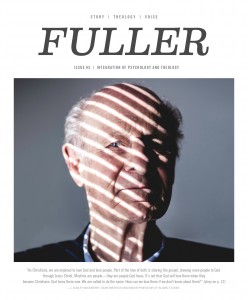Living an Integrated Life

On a recent trip to China, I met a young pastor who was trying to put pieces of his life, his ministry, and his world together. Just as his country is undergoing dramatic and rapid change, so is he. Having come from a rough background, he finds it unlikely that he would have become a Christian, let alone that he would serve—as he does now—as a pastor in the registered, Three-Self church. As a father, still further complexities and anxieties plague him for his family. This young brother spoke honestly with me about many personal needs, and then he said, “The most helpful thing for me has been reading Paul Tournier.”
That the name of a Swiss Christian psychiatrist would suddenly appear in a conversation in the middle of China was a thunderbolt. Paul Tournier? I wondered aloud: “How do you know of him?” The psychiatrist’s name popped up in my friend’s Internet search, which led to him reading Tournier’s book The Meaning of Persons. “It has been the most important, valuable resource I have found,” he said excitedly. “How do you know of him?”
My amazement arose from the fact that when I was a new Christian, rying to put pieces of my life, ministry, and world together, Tournier had been the same help to me. The sense of a dis-integrated, fractured life had left me confused and hungry for help. I was an emerging young adult, a baby in faith, a perplexed young man, an inquiring student, and it seemed that college classes and new friendships only took me into deeper questioning. I was looking for help from someone far more insightful and informed than I was when I heard from a friend about the integration of theology and psychology stoked by Paul Tournier’s clinical experience and thoughtful Christian wisdom. I proceeded to read everything he had written. Though the details of what I faced back then were dramatically different than those of my Chinese friend, both our searches were driven by the same question: What does it take to live a truly human life?
Even more than Tournier’s writings, it was that introduction to theological and psychological integration that proved most meaningful to me in the years since. Marriage, parenting, death of loved ones, pastoral ministry, struggles with two seasons of depression, and the myriad challenges of midlife—all have provided plenty of opportunity for integration to prove its vital role in my own journey. That journey has included seasons of psychotherapy, and though not every 50-minute session proved transformative, I matured in ways I would not have otherwise because of many remarkable, life-changing moments in those sacred contexts.
Integration is needed on a personal level, but also on social, intellectual, and pastoral levels. Though psychology is not my academic discipline, I continue to read in the field and to find voices that raise important challenges. Decades of experience serving the church have taught me that preaching—affected as it often is by pop-psychology-influenced culture—can easily be psychologically unhealthy. Though denial, deflection, and scapegoating are handy crutches in challenging circumstances, true integration requires looking at the problem of evil up-close and personal, for our own sakes and for the sake of others. It is very hard work and requires tremendous courage.
As pastor, leader, theologian, and preacher, I want my work to be psychologically responsible. Only God knows the vulnerabilities of those I might influence, and the Good Shepherd would want me to be a truthful, kind, and loving expression of the gospel—integrated and ever-maturing. All of us lead out of brokenness, and the integration of theology and psychology can help us find the means to bring more than brokenness to our relationships and work lives. Integration, whether personal or intellectual, is never finished, but “the One who has begun a good work in us will bring it to completion in the day of Jesus Christ.” That also means that our journey is never alone. Whether in Beijing, Paris, Beirut, or Pasadena, the One who integrates us in love is also with us.
Encounter is part of Peter Brook’s [MAICS ’15] “Heaven and Earth” collection, a series of paintings he completed for his capstone theology and art thesis project. Inspired by abstract expressionists and traditional iconography, he sees his creative process as a form of worship and uses painting, he says, “to convey spiritual meaning and theological ideas.” Peter’s work is currently exhibited in Fuller Pasadena’s Payton Hall in an exhibit curated by Maria Fee, adjunct faculty for Fuller’s Brehm Center for Worship, Theology, and the Arts. Hear Peter’s “Heaven and Earth” presentation.
+ Encounter (2015) by Peter Brook, acrylic and gold leaf on canvas, 40″ by 60″, peterbrookarts.com
Viviendo una Vida Integrada
 En un viaje reciente a China, conocí a un pastor joven que estaba tratando de juntar las piezas de su vida, su ministerio y su mundo. Así como su país está atravesando cambios rápidos y dramáticos, también los está atravesando él. Viniendo de un origen difícil, considera que era poco probable que se haya convertido en cristiano, mucho menos en pastor –como lo es ahora- de la iglesia registrada Las Tres Autonomías. Como padre, carga aún con más complejidades y preocupaciones por su familia. Este joven hermano habló honestamente conmigo sobre muchas necesidades personales, y luego dijo, “Lo que más me ha ayudado fue leer a Paul Tournier.”
En un viaje reciente a China, conocí a un pastor joven que estaba tratando de juntar las piezas de su vida, su ministerio y su mundo. Así como su país está atravesando cambios rápidos y dramáticos, también los está atravesando él. Viniendo de un origen difícil, considera que era poco probable que se haya convertido en cristiano, mucho menos en pastor –como lo es ahora- de la iglesia registrada Las Tres Autonomías. Como padre, carga aún con más complejidades y preocupaciones por su familia. Este joven hermano habló honestamente conmigo sobre muchas necesidades personales, y luego dijo, “Lo que más me ha ayudado fue leer a Paul Tournier.”
Que el nombre de un psiquiatra suizo cristiano apareciera en una conversación en el medio de China fue como un relámpago. ¿Paul Tournier? Me pregunté en voz alta: “¿Cómo sabes de él?” El nombre del psiquiatra apareció en una búsqueda de internet de mi amigo, llevándole a leer el libro de Tournier El Significado de las Personas. “Ha sido la fuente más importante y valiosa que he encontrado,” dijo entusiasmado “¿Cómo es que tú sabes de él?”
Mi sorpresa surgió del hecho de que cuando yo era un nuevo cristiano, tratando de juntar las piezas de mi vida, mi ministerio y mi mundo, Tournier había sido la misma ayuda para mí. El sentido de una vida fracturada y desintegrada me había dejado confundido y necesitado de ayuda. Yo era un joven adulto emergente, un niño en la fe, un joven perplejo, un estudiante curioso, y parecía que las clases en la universidad y las nuevas amistades sólo me conducían a cuestionamientos más profundos. Estaba buscando ayuda de alguien con mucha más información y perspicacia que yo, cuando me enteré por un amigo sobre la integración de la teología y la psicología incentivada por la experiencia clínica y la concienzuda sabiduría cristiana de Paul Tournier. Procedí a leer todo lo que había escrito. Aunque los detalles de lo que yo enfrentaba en ese momento eran completamente diferentes a los que enfrentaba mi amigo chino, nuestras búsquedas surgían de la misma pregunta: ¿Qué se necesita para vivir una vida humana verdadera?
Más que los escritos de Tournier, la introducción a la integración teológica y psicológica fue lo que demostró ser más significativo para mí a través de los años. El matrimonio, el ser padre, la muerte de seres queridos, el ministerio pastoral, las luchas con dos temporadas de depresión y un sinfín de desafíos de la mediana edad –todo eso ha provisto mucha oportunidad para que la integración pruebe su rol vital en mi propio viaje. Ese viaje ha incluido temporadas de psicoterapia y, aunque no todas las sesiones de cincuenta minutos resultaron transformadoras, he madurado de formas que no hubiera podido madurar de otra manera debido a muchos momentos notables y transformadores en esos contextos sagrados.
La integración es necesaria a nivel personal, pero también a nivel social, intelectual y pastoral. Aunque la psicología no es mi disciplina académica, continúo leyendo dentro de ese campo y encontrando voces que puedan
crear importantes desafíos. Décadas de experiencia sirviendo en la iglesia me han enseñado que el predicar –afectado como lo está usualmente por la cultura con influencia de psicología pop- puede ser psicológicamente insalubre. Aunque la negación, la desviación y tener chivos expiatorios son muletas convenientes a la hora de desafiar las circunstancias, la verdadera integración requiere encarar el problema del mal en forma cercana y personal, por nuestro propio bien y por el bien de las demás personas. Es un trabajo duro y requiere tremenda valentía.
Como pastor, líder, teólogo y predicador, quiero que mi trabajo sea psicológicamente responsable. Sólo Dios sabe las vulnerabilidades de aquellas personas que puedo influenciar, y el Buen Pastor quiere que sea honesto, bondadoso y que exprese el amor del evangelio –integrado y madurando en forma constante. Nosotros y nosotras lideramos desde el quebrantamiento, y la integración de la teología y la psicología pueden ayudarnos a encontrar los medios para aportar algo más que quebrantamiento a nuestras relaciones y vida laboral. La integración, ya sea personal o intelectual, nunca finaliza, pero “Aquel que ha comenzado una buena obra en nosotros y nosotras la completará en el día de Jesucristo.” Eso también significa que nuestro viaje nunca lo hacemos por nuestra cuenta. Ya sea en Pekín, Paris, Beirut o Pasadena, Aquel que nos integra en el amor está también con nosotros y nosotras.
통합적 관점으로 삶을 이해하기

 최근 중국 여행에서 만난 한 젊은 사역자는 그의 개인적 인 삶, 사역 그리고 세계를 통합적으로 이해하려고 애쓰는 중이라고 했습니다. 자신의 나라가 빠르고 격 하게 변화하고 있는 것처럼 그 자신도 그렇게 변하고 있었습니다. 험한 환경 속에서 성장한 그로서는, 기독 교인으로 더구나 정부에 등록 된 삼자 교회(Three- Self church)에 속한 목회자가 될거라고 생각해본 적이 없었습니다. 이러한 예상치 못했던 사역이 가져온 고뇌 와 함께, 한 가장으로서 가족을 향한 또 다른 걱정과 염려도 그의 마음을 무겁게 하고 있었습니다. 이 젊은 형제는 저와 여러 사적인 필요와 바램에 대해 솔직히 나누 서, “폴 투르니에 (Paul Tournier)의 책을 읽어온 것이 무엇보다도 힘이 되었다”고 말했습니다.
최근 중국 여행에서 만난 한 젊은 사역자는 그의 개인적 인 삶, 사역 그리고 세계를 통합적으로 이해하려고 애쓰는 중이라고 했습니다. 자신의 나라가 빠르고 격 하게 변화하고 있는 것처럼 그 자신도 그렇게 변하고 있었습니다. 험한 환경 속에서 성장한 그로서는, 기독 교인으로 더구나 정부에 등록 된 삼자 교회(Three- Self church)에 속한 목회자가 될거라고 생각해본 적이 없었습니다. 이러한 예상치 못했던 사역이 가져온 고뇌 와 함께, 한 가장으로서 가족을 향한 또 다른 걱정과 염려도 그의 마음을 무겁게 하고 있었습니다. 이 젊은 형제는 저와 여러 사적인 필요와 바램에 대해 솔직히 나누 서, “폴 투르니에 (Paul Tournier)의 책을 읽어온 것이 무엇보다도 힘이 되었다”고 말했습니다.
폴 투르니에 (Paul Tournier)라고? 스위스의 정신과 의사이자 기독교인이었던 폴 투르니에 박사의 이름을 중국 대륙의 한 가운데에서 듣게 되리라고는 상상도 못한 일이었습니다. “아니 어떻게 폴 투르니에 박사를 알고 있죠?” 저는 놀라서 되물을 수밖에 없었습니다. 인터넷을 검색하다 우연히 폴 투르니에 (Paul Tournier) 의 이름을 발 하게 된 그는, 투르니에의 대표적 저서 중 하나인 ‘The Meaning of Persons’을 찾아 읽게 되 었다고 했습니다. “그 책은 제가 만난 모든 책들 중에 서 제 인생에 가장 중요하고 가치있는 것입니다.” 라 고 말하면서, 오히려 저에게 “총장님은 그분을 어떻게 아시죠?” 라며 되물왔습니다.
사실 제가 놀란 이유는, 저에게도 개인적 삶, 목회, 그리고 세계의 의미와 목적을 함께 맞추어 보려고 애쓰던 때가 있었고, 그 당시 폴 투르니에가 저에게 큰 도움이 되었기 때문이었습니다. 어딘가에서 결코 맞추어지지 않을 것 같은 부서진 삶의 조각들을 안은 채, 저는 도움을 구할 수밖에 없었습니다. 마음의 혼란 은 대학의 수업을 들으면서도, 새로운 친구들을 만나면 서도 역시 더해만 갈 뿐이었습니다, 어른이 되었다고는 하지만 여전히 연약한 믿음을 가진 어린 학생에 불과 하였던 저로서는 통찰력을 가지고 방향을 제시하여 줄 누군가를 기대했던 것이 어쩌면 당연한 일이었는지도 모릅니다. 이 때 마침 한 친구를 통해, 본인의 임상 경험과 기독교 정신에 입각해, 신학과 심리학을 하나로 통합해 이해하고자 했던 폴 투니어 박사에 대하여 듣게 됩니다. 그 후 저는 폴 투니어 박사가 쓴 모든 저서를 다 찾아 읽었습니다. 저의 경험이 물론 중국에서 만났던 형제의 경험과 자세한 내용까지 다 같을 수는 없겠지만, 결국 우리 두 사람 모두가 동일한 질문, “가장 진실된 모습의 삶을 산다는 것은 인간에게 무엇을 의미하는가?”에 대한 답을 얻고자 했던 것은 분명합니다.
신학과 심리학을 연계하여 이해하기 시작하면서, 저는 이 후 제 인생에 찾아온 각각의 전환점들을 역시 같은 관점으로 바라보는 것을 배우기 시작했습니다. 결혼, 자녀 양육, 사랑했던 이들의 죽음, 목회 사역, 두 차례에 걸친 우울증, 또 수많은 중년기 도전의 순간 들을 경험하며 전 제 삶의 여정 자체에 신학과 심리학 의 통합적 관점으로의 이해가 얼마나 중요한지 배울 수밖에는 없었습니다. 상담 치료의 기간은 저에게, 그 통합적 시각의 연장선에서 제 삶을 이해할 수 있도 록 해 주었습니다. 물론 그 50분의 상담마다 매번 제가 변한 것은 아닙니다. 하지만, 그 시간과 과정들은 제가 이전에 절대로 가질 수 없었던 성숙과 변화로 저 를 이끌었습니다.
통합적 관점으로의 이해는 우리 각자의 삶에서 뿐만이 아니라, 사회적, 지식적, 목회적으로도 적용될 수 있어야 합니다. 저는 전공 분야가 심리학은 아니지만 꾸준히 책을 찾아 읽으며 최근 쟁점이 되고 있는 논의 에 항상 귀를 기울이고자 노력합니다. 오랜 시간 교회 를 섬기며 깨달은 점은 설교도 건강하지 못할 수 있다 는 것입니다. 교회 안의 설교마저도 대중 취향에 맞춰 심리학을 편리하게도 오용하는 요즘 세태의 영향을 받 가 쉽습니다. 힘든 상황에서는 문제를 부인하거나 왜곡하고 또는 다른 이에게 책임을 전가해버리는 것이 탈출구처럼 여겨질 수도 있습니다. 그러나 통합적인 관점으로 삶을 이해한다는 것은 우리 자신을 위해, 또한 다른 형제, 자매들을 위해 그 악의 근본적 문제를 직시하여 바라보는 것을 의미합니다. 이것은 매우 어려 운 일이며 큰 용기가 필 한 일입니다.
목회자, 지도자, 신학자, 설교자로서, 전 제가 하는 모든 일이 미칠 수 있는 정서적 영향력을 잘 인지하고 있습니다. 오직 선한 목자되신 우리 주님께서만이 저의 말 한마디로 상처받을 수 있는 마음들을 잘 아시기에, 제가 항상 진실하고 온유한 사랑의 표현으로, 복음의 증거가 되어 하나됨을 실천하고, 끊임없이 성장해야 함을 지도하십니다. 우리 모두에게 부서지고 깨어졌던 기억이 있습니다. 온전히 하나로 회복된다는 것은, 그 논의의 차원이 개인적이던 또는 학문적이던지 간에, 어느 한 시점에서 완성되어 끝낼 수 있는 숙제가 아닙 니다. 하지만 우리에게는 우리 가운데 선한 일을 시작 하신 이가 그리스도 예수의 날까지 이루실 것을 확신 하는 믿음이 자리하고 있습니다. 우리 옆에 동행하시 는 이가 계시기에 결코 이 여정은 외롭지가 않습니다. 그곳이 Beijing, Paris, Beirut, 또는 Pasadena 이든지 간에 우리를 사랑하시며 온전히 회복시키시는 그 분 께서 우리와 함께 하십니다.


